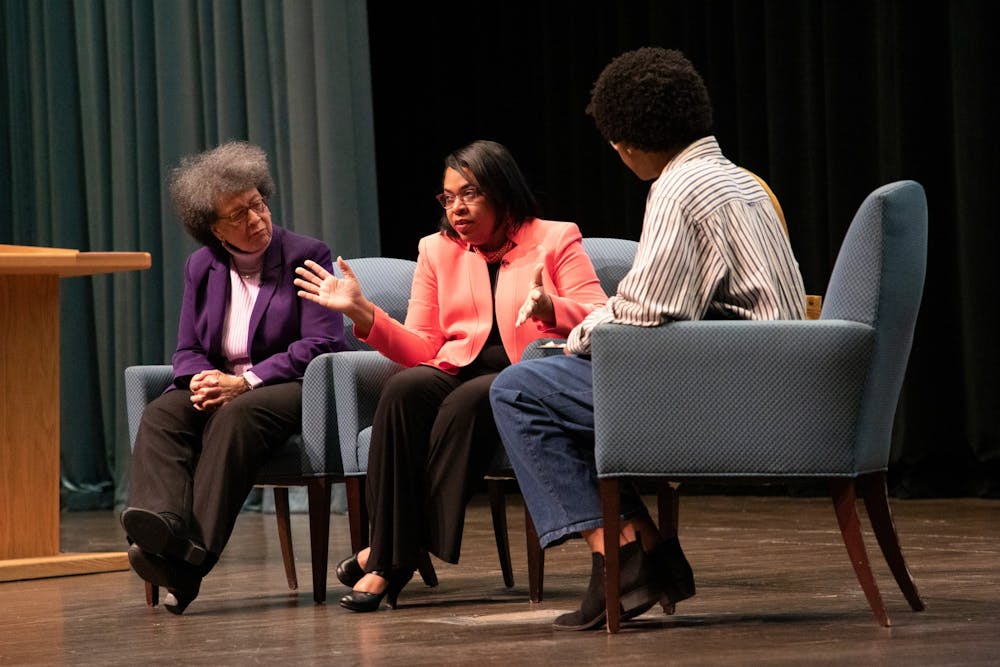Editor's Note: Tierra Harris, member of Ball State's National Association of Black Journalists who hosted the Q&A session, is a reporter for The Daily News.
Jennifer Pinckney said June 17, 2015 “started off as a regular day,” before she and her husband Clementa Pinckney traveled to Charleston, South Carolina, with their 6-year-old daughter Malana.
Later that day, nine people including her 41-year-old husband, a pastor and South Carolina state senator, were killed by a 21-year old white supremacist in the Mother Emanuel African Methodist Episcopal church
In honor of Black History Month, the Impact Movement, a Christian student organization at Ball State, welcomed Jennifer Pinckney to Emens Auditorium to speak about her traumatic experience and how she has learned from the death of her husband.
Pinckney said she and her daughter were in the pastor’s office during a bible study. When she first heard the sounds outside the office, she said she thought an electrical generator had exploded.
“Then it hit me that those were gunshots and I snatched my child up like she weighed nothing,” Pinckney said. “I shoved my child underneath the desk and I covered her mouth with my hand, and she in turn covered my mouth with her hand.”
Pinckney said she crawled back to the office to pick up her cell phone and call 911 after gunshots had stopped. She and Malana stayed under the desk and listened to first responders walk into the church.
When they walked out of the church, Pinckney said Malana closed her eyes while being carried out by a first responder. As Pinckney walked past the bodies, she said she thought, “there’s so much blood, too much blood.”
During her speech, Pinckney said people have told her they will miss Clementa “for always taking the time to talk to [them].”
“I love you, darling,” she said were her husband’s last words before walking out of the office into bible study.
Concluding her message, Pinckney said she is “a living example of how one can rise out of trauma like the morning sun and move forward into the radiance of the hope that God gives us.”
Continuing with the sentiment of having faith in God, Margaret Weaver, counseling psychologist and founder of Keystone Counseling Center in Atlanta, Georgia, spoke about the importance of not internalizing trauma.
Weaver also told the story of Emmett Till, the 14-year-old African American who was lynched in 1955 in Mississippi after being accused of offending a white woman. She spoke about how his mother Mamie Till decided to have an open-casket funeral for Emmett, in order for the public to see the brutality with which her son had been murdered.
“I think what Mamie Till says to us and says to the African-American community is tell the story,” Weaver said. “When there has been trauma, when we’ve been traumatized, tell the story.”
In her speech, Weaver reiterated the importance of sharing trauma-related stories with people and controlling their narratives.
“We must not internalize white supremacy and allow it to become black inferiority,” she said. “I think it’s important that we do not allow traumatization to become immobilization.”
Her speech was followed by a Q&A session which focused on mental health in the African-American community and how Pinckney has recovered from her trauma. Pinckney said she goes to therapy once every two months.
“I would definitely tell anyone, don’t think you’re too good to have counseling or that black people don’t go to counseling,” Pinckney said. “Counseling is essential and vital whenever you’ve been through something traumatic or just if you’re having any problems.”
Chris Mack, a 2015 Ball State graduate and director of Mercy Muncie’s City Hope Fellowship church, said the Q&A session was his favorite part of the event.
“In particular, with Christian spaces, I think it’s difficult to remember that healing has to happen over time,” he said. “I’m used to being in spaces that say ‘Hey, you don’t need to go to counseling, you just need to pray about,’ and that can do a lot of harm. So, to hear someone who is a Christain to say ‘Counseling is important,’ is what I love hearing.”
Contact Grace McCormick with comments at grmccormick@bsu.edu or on Twitter @graceMc564.





